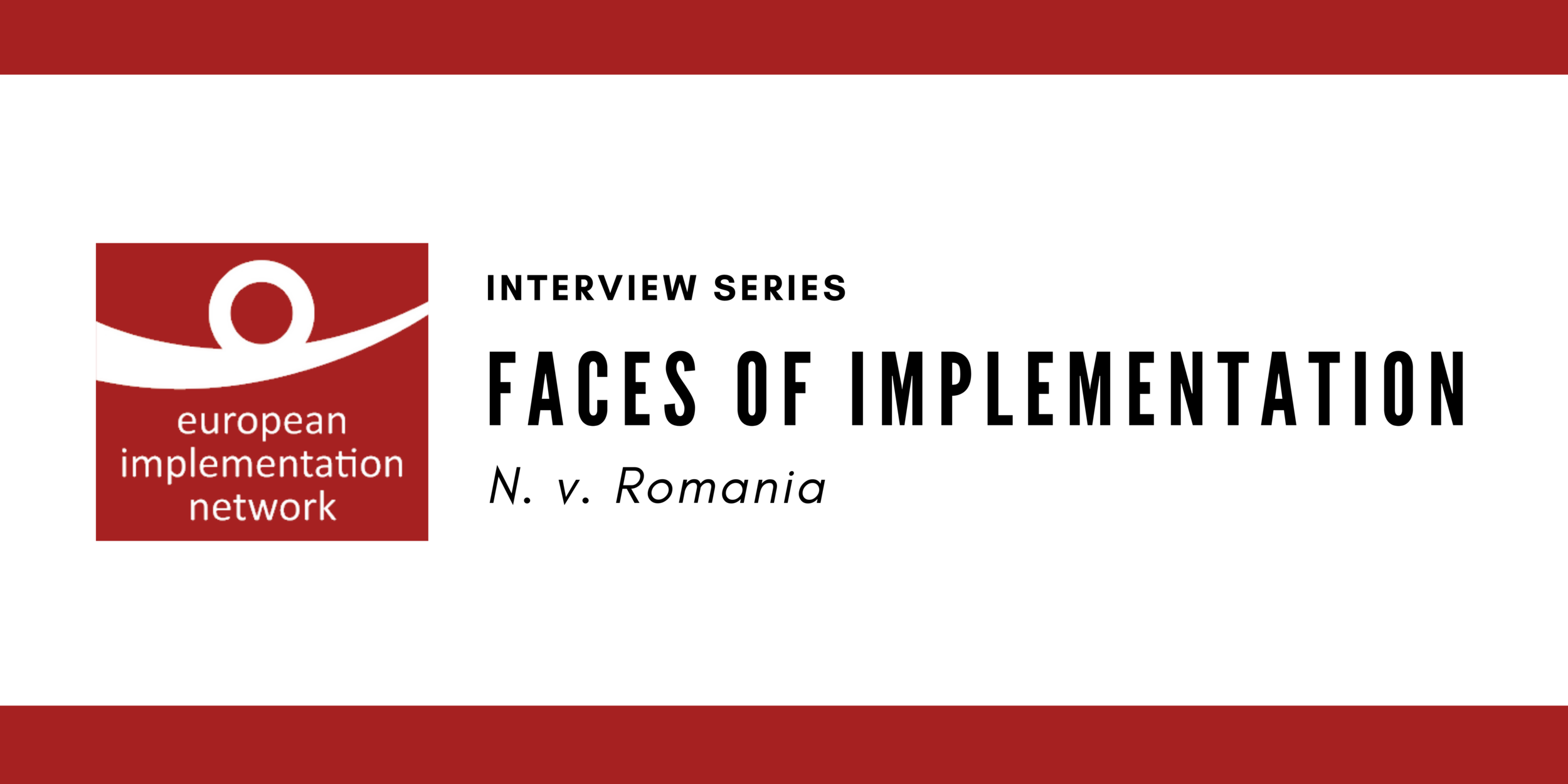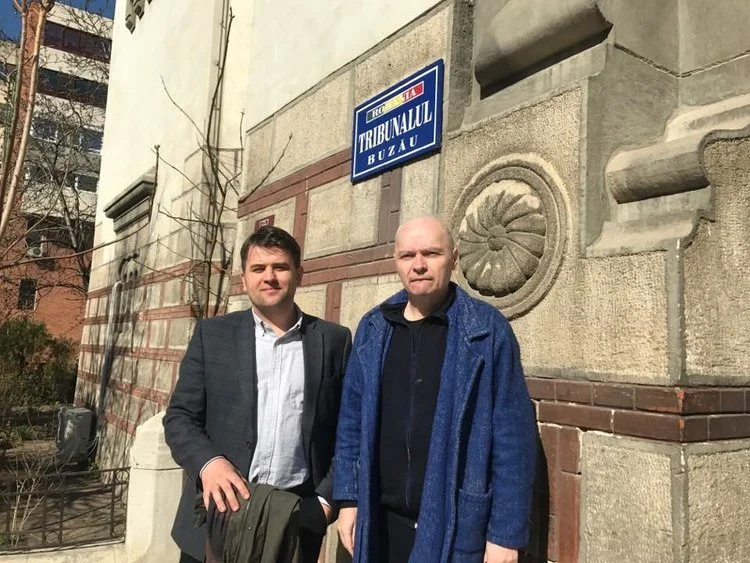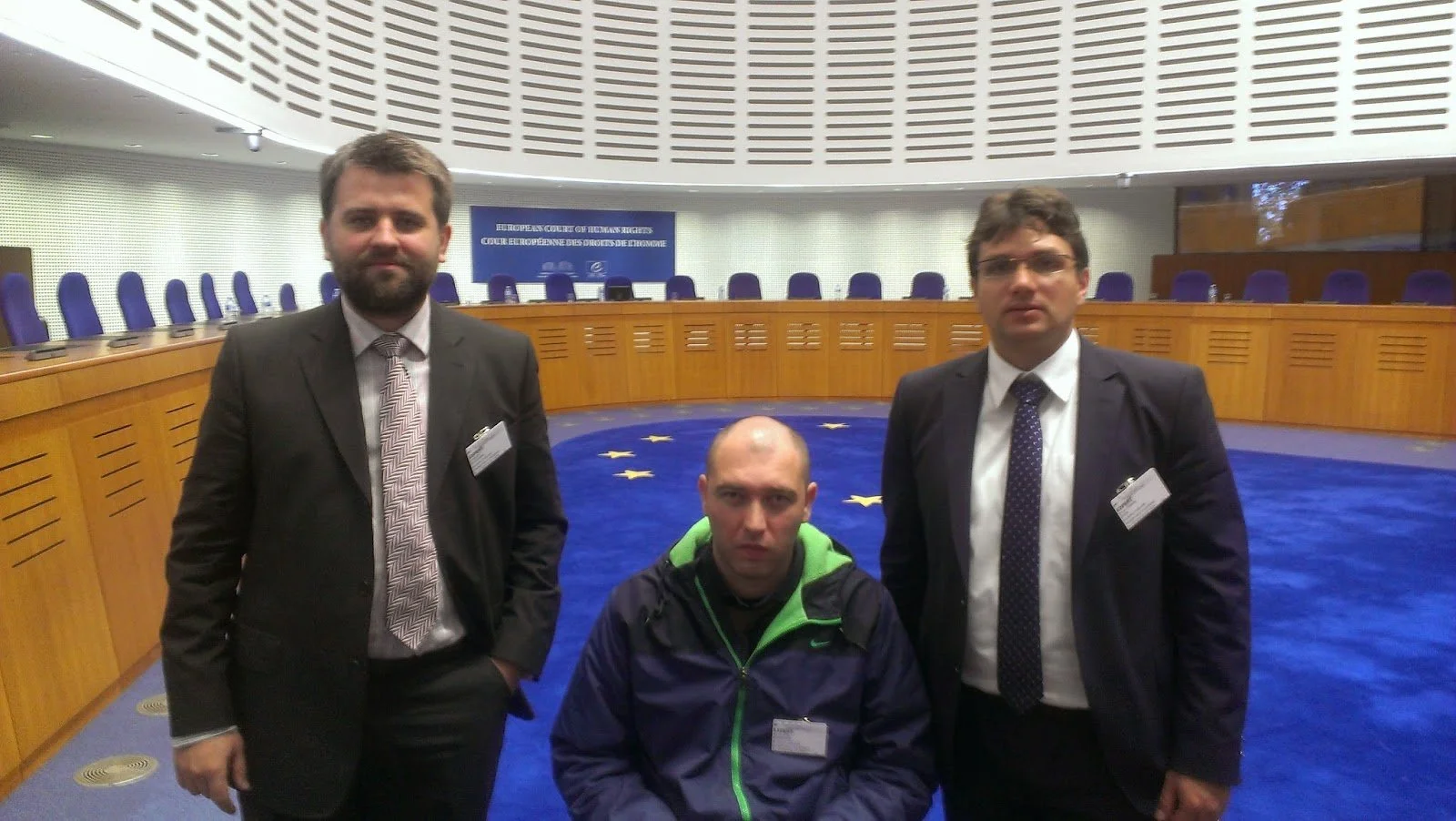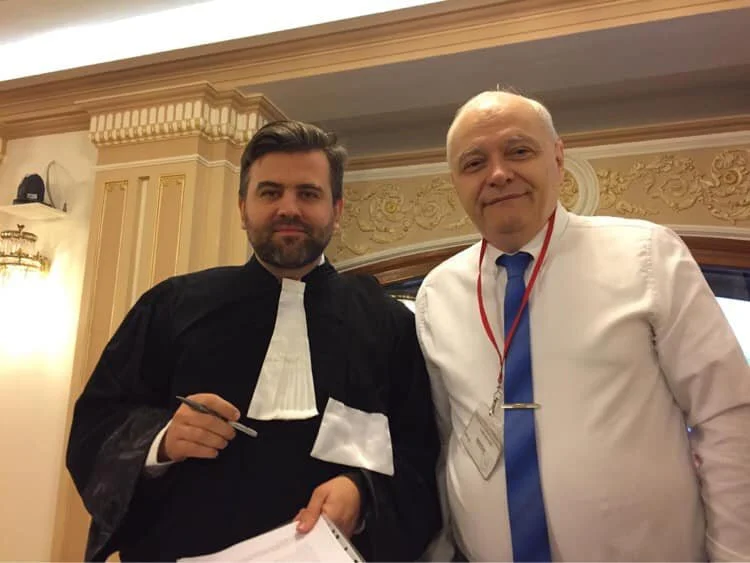While countries strive for equality and inclusion, people with psycho-social disabilities are still not having their voices and stories heard. This struggle is led by the disability rights movement, advocating for laws and policies to be changed to better support their community members.
The case of N v. Romania displays this struggle. In this case, the applicant was unlawfully confined to a psychiatric hospital, as a security measure, and he was not able to obtain a judicial review for a very long time.
We spoke with Mr. N., applicant in the judgment N. v. Romania, and with lawyer Constantin Cojocariu, who has represented Mr. N. before the national authorities and before the ECtHR. Constantin specialises in non-discrimination law and the European Convention on Human Rights, and he has been carrying out strategic litigation before the European Court - as well as Rule 9 submissions to the Committee of Ministers regarding the implementation of the N v. Romania case.
Disclaimer: The Applicant has agreed to the publication of his story along with photos taken of him via his Lawyer.
Interview with Constantin Cojocariu
Introduction
My name is Constantin Cojocariu, I’m a Romanian human rights lawyer practising for almost 15 years, but I’ve also worked for international NGOs for a very long time. My work predominately focuses on disability and LGBT rights. Over the last 5-6 years, I’ve also been a litigator, working with national courts and the European Court of Human Rights (‘ECtHR’) and in close collaboration with applicants and local NGOs in Romania and other countries. I’ve been involved in the N. v. Romania case since 2014, when I visited Mr. N. at the psychiatric hospital where he had been for many years. When I met with him, his case was already pending at the ECtHR, and we agreed that I would act as his representative in proceedings before the Court.
Background of the case
Mr. N. is a psychiatric patient, but he is also a member of a subgroup of forensic psychiatric patients. These individuals are hospitalized, or rather placed in a type of secure detention, for having been suspected of committing a crime. In 2000, Mr. N. was suspected of having committed a crime, but charges against him were dropped after he was placed in a psychiatric hospital that same year.
In addition to Mr. N.’s detention, he was placed under legal guardianship while litigation was ongoing at the ECtHR, as the Court had asked for him to have representation. However, the only form available of representation for persons with psycho-social disabilities under Romanian law is legal guardianship, which is a complete removal of legal capacity and allocation of that legal capacity to a third party, often a representative of the state. This case does not specifically address the apparent issues with guardianship, though the subsequent judgment N. v. Romania (No. 2) does address it.
In Romania, residential institutions are responsible for the mental health and social care of people with psycho-social disabilities. As you can imagine, individuals under secure psychiatric detention often suffer from the additional stigma of being regarded as incurable criminals. If individuals do not have family or community support or financial means, they usually spend their lives in institutions. This predicament was the case for Mr. N. and is typical of institutionalized people with psycho-social disabilities in Romania.
The case highlights the broken system and the lack of support for individuals with disabilities. In 2017, the ECtHR found that Mr. N. was unlawfully institutionalized, which allowed the responsibility to be placed on the state to provide that support. This support would aid individuals to reintegrate into the community. However, it does not exist. It is a systemic problem, one that the Court outlines in the N. v. Romania judgment. There is no process to return people to the community or provide support.
Another issue in the case was - and still is - access to justice for Mr. N., and for persons with psycho-social disabilities in general. For people like Mr N, even if they ended up in court, nothing they could say would help them because they are stereotyped as crazy and dangerous. The domestic judgment quite clearly illustrates this, as everyone involved, police, judges, doctors, collaborated to keep him in there. Access to justice was an illusion.
Implementation Developments
We got the ECtHR judgment in 2017. At the end of 2018, we wrote to the Committee of Ministers (‘CM’). Mr. N. was still institutionalized at this time, and I made it clear to the hospital in my correspondence, and this is made clear in the Court’s judgment too, that he could not just be released into the community without support. Simply opening the doors for him to leave was not a solution.
Support needed to be in place for him to return to the community and have a chance to rebuild his life. Because there is no infrastructure, this presented the authorities with a huge problem. We made submissions to the CM regarding individual measures, where we highlighted that the authorities must ensure conditions for him to be released safely into the community. During this time, I got in touch with the Estuar Foundation in Bucharest that had experience and provided services for people with psycho-social disabilities.
We asked the government to provide funding for sheltered community housing services. Many of the sheltered houses in practice are not community-based, they are usually institutional, and we didn’t want that either.
In its’ December 2018 decision, following our submissions, the CM encouraged the authorities to ensure that the applicant can move into sheltered housing which had been procured for his accommodation, as soon as qualified staff have been assigned. The CM also raised concerns about the fact Mr. N. was placed under legal guardianship, because it deprived him of his civil and political rights, stating that the current system for legal guardianship for adults in Romania had to be reformed.
In May 2019, he moved to a social care home in Bucharest. It was a step up because he finally left the psychiatric hospital and the label of dangerous patient behind. This victory was achieved thanks to the pressure brought by filing submissions to the CM.
I did have my doubts about persuading the CM. The Romanian authorities had to support Mr. N., and the support had to be ongoing. This support was a critical part of the implementation. We made this argument, and the CM included it in their decision.
Advocating for General Measures
Constantin Cojocariu with the applicant, Mr N, in front of Court in Romania in 2018.
Image Credit: Constantin Cojocariu
By the end of 2018, we made a Rule 9.2 submission on general and individual measures. We outlined two central problems that his case exemplified: the lack of infrastructure for returning psychiatric patients and people in institutions to the community, and the need to ensure access to justice to persons with disabilities. But these psychiatric patients required some specific structures: like halfway houses and supervised returns. The submission was a joint effort with the Association for the support of children with special needs, the Estuar Foundation, and the European Network for Independent Living. I was keen to have support from international and national NGOs and very appreciative of their efforts.
The state had submitted a very superficial action plan that lacked acknowledgement of the problem or commitment to improving it. Romania has quite a bad track record implementing Court judgments, particularly related to people with disabilities. They are not a priority.
Meanwhile, at national level, we also had proceedings pending before the Constitutional Court to have the legal guardianship provisions declared as unconstitutional. We wanted to show that the current system of guardianship for adults was contrary to the rights of persons with disabilities and the system needed to be changed. Less than two years after the CM 2018 decision, in July 2020, the Constitutional Court finally ruled that plenary guardianship was unconstitutional. Now the guardianship legislation must be changed, and this message came from both the CM and the Constitutional Court.
The CM last examined the case in September 2021, requesting the authorities to continue to monitor the applicant’s situation. It also required the government to deliver an adequate action plan by March 2022, particularly with regard to measures taken or envisaged to address the shortcomings in the system of placements in psychiatric hospitals as security measures. However, to this day, the government hasn’t submitted a proper action plan.
At the domestic level, we had various discussions with people in Romania to adopt a possible draft bill. There was awareness before the case that the law on mental health had to be revised for change to be real and substantive. However, there is still no commitment for substantive change.
Challenges in Implementation
Image Credit: Constantin Cojocariu
Constantin Cojocariu (left) represented an applicant in the 2014 case of Gherghina v. Romania, concerning Romanian authorities' failure to ensure universities were accessible.
The next big challenge is addressing the issue of legal guardianship. We are waiting for that law to change, for there to be alternatives, for him to receive support that is respectful of his legal personhood. Currently, there are no alternatives to legal guardianship. He is still under guardianship because the alternative would be worse. We managed to explain this in our correspondence with the CM. They could see that it’s also necessary to reform the guardianship system for this judgment to be fully implemented.
There were, and still are, a lot of challenges along the way. I was proving to myself and others that the implementation process works. It’s had some positive results, but it’s a work in progress. At the moment, a lot of circumstances are unfavorable to implementation, with COVID-19 and the economic, political, and public health situation in Romania. It leaves people with disabilities at the bottom of the priority list. But hopefully, that will pass and, when that passes, maybe there will be another opening, and we will be ready to take advantage of it. Despite these difficulties, I feel there is progress, the process is moving. We have a chance, it’s not all lost, and hopefully, if we use these opportunities, there will be a change eventually.
Remaining Recommendations
Romania must address the deficiencies in the system of placements in psychiatric hospitals as security measures, and it must ensure effective safeguards against arbitrary or unlawful deprivations of liberty in psychiatric hospitals.
Furthermore, we are still waiting for guardianship laws to be reformed. I think that’s the critical part. It’s been on permanent standby. The Constitutional Court published its decision in January 2021, which stated that the government had 45 days to adopt legislation on guardianship. But it hasn’t happened. And that’s a stronger legal obligation than that provided by the ECtHR. But it will happen eventually. Everyone is in limbo, especially people with psycho-social disabilities under guardianship or who could be subject to them. They are waiting for this new legislation and for support to be available. Once amended, we can ask that Mr. N. benefits from that support. And with those supportive measures in place, he could get a job and make decisions about spending his money. And that’s critical. Because now he is happy, he has a supportive guardian, but it’s not enough.
Advice to CSO’s
Constantin Cojocariu with the applicant, Mr N, attending a hearing at the Constitutional Court at the end of 2019.
Image Credit: Constantin Cojocariu
My advice to civil society organisations is to get a good lawyer. Someone knowledgeable of the system. Of course, everyone knows the big picture, but being able to take advantage of all the opportunities that the system offers, in theory, requires some experience and specific legal knowledge, which is not widely available for all issues in all countries.
You could submit to the CM, and you should, but it will not be enough to ensure full implementation. Your strategy should be long-term. It’s not easy, but you need a good legal team to use the process. Keep on going. I think everyone is aware that change will not happen overnight. Be ready for the long haul.
N. v. Romania (No. 2)
Since the interview with Constantin, the European Court of Human Rights ruled on N. v. Romania (No. 2) (Application no. 38048/18), regarding the question of guardianship. The Court rightly finds that Romania must reform its legislation on legal guardianship.
Image Credit: Photo by Amy Elting on Unsplash
Relevant Information on N. v. Romania
Applicant Communications
Government Communications
NGO/NHRI Communications
CM Decisions
We always welcome feedback, please let us know how we can improve this series: contact@einnetwork.org








